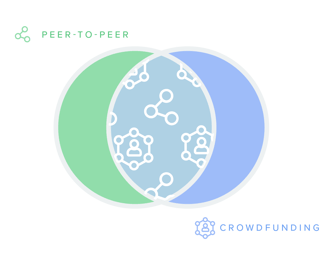Peer-to-crowdfunding: a combined method of fundraising
Peer to Peer Fundraising and Crowdfunding for Nonprofits, why their mix is a powerful fundraising method.

Both crowdfunding and peer-to-peer fundraising methods have proved themselves right. Efficient, differentiators, innovative… But both methods are also linked to some limitations due to their very own nature.
In this article we’ll try to determine the strengths and weaknesses of each method and show how a new mixed-method could help you to take advantage of both of them. Let’s see how.
Take a crowdfunding campaign, for example. What are the main strengths of this approach? There is one common goal to achieve together. A fundraising target to reach with a concrete and clear impact for your beneficiaries and supporters.
Where the money goes is clearly determined (i.e. build a dispensary) and in some cases you even know how your own participation will help the global project (i.e. 50€ will be a set of medicinal products). For some time, crowdfunding for nonprofits has been considered a strong fundraising campaign approach.
The main limitation is linked to the fact that this method is fully driven by the organization itself. The message, the timeline, the targeted audience… Every core element of the process is determined by the organization, putting your supporters on a second plan in terms of implication. They other love the project or not and decide to support the project, or not.
Now, let’s take a look at peer-to-peer fundraising. Quite the opposite in fact. Supporters decide themselves to take action for your cause. The real power of this strategy results in the opportunity for your organization to reach new people through your supporters that you might have never been able to reach or convince to donate.
Fundraisers are fully committed and highly motivated because THEY are in charge. In charge of strategy, communication, storytelling… This is powerful.
But, if you’re looking deeper, even if you may propose campaigns to get involved in and peer to peer fundraising ideas, tips and material, at the end of the day they’ll have to determine their own strategy, explain how the raised funds will be used, etc. This could be challenging and a little bit scary for your less courageous supporters.
Learn more about the differences between peer to peer and crowdfunding in this article.
So, what if you could propose a mixed-method to use the power of each traditional fundraising method?
The idea is quite simple. Going through a classic peer-to-peer campaign to benefit from the “strong engagement” part of this fundraising method, but instead of proposing a classic birthday or sporting campaign, you may propose to get engaged in a kind of campaign that uses leverages of crowdfunding to be more attractive. This means proposing fundraisers to reach a concrete goal directly linked to beneficiaries.
Thanks to this method, you’ll benefit from both crowdfunding and peer-to-peer strengths and avoid their own limitations.
The case of the charity 1001 Fontaines.
1001 Fontaines is a French NGO working on bringing access to clean water around the world. They used a classic peer-to-peer fundraising platform and configured their different campaigns in a crowdfunding mode.

They created 5 different online fundraising campaigns:
- Free Campaign: as with any Peer to Peer campaign, fundraisers are invited to create their fundraising page for any occasion (birthdays, sporting events, etc..) and raise as much funds as possible to support the organization. This is a really classic configuration.
- Class Campaign: here is the first example of a peer-to-crowdfunding campaign. The goal of this campaign is to finance access to clean water for a class of 30 students during 5 years. As in crowdfunding, it is a really specific goal with concrete action behind. €300 are needed to finance this specific project so fundraisers should raise at least €300 when registering for this campaign.
The interesting part is that fundraisers now have powerful storytelling to share with their network. Even better, the organization set up a series of emails, social media posts and updates dedicated to this specific project so fundraisers can actually know which school they are helping and follow up with beneficiaries.
- School campaign: Same model as the class campaign, but the goal is to raise €1,000 to provide clean water for an entire school during a year. Basically, this campaign allows the organization to target a donor base and fundraisers that have higher potential.
- Village Campaign: Once again, the model is the same. Here there is a €10,000 goal to finance access to clean water to an entire village. For this campaign, fundraisers can register as individuals or teams. An interesting feature to push supporters to team up for the organization, as a group of individuals or even companies, and encourage some friendly competition.
- Water Kiosk Campaign: Here the organisation aims for a €32,000 fundraising goal. A pretty high one, but highly linked to one of the core products of the organization. Also an efficient way to spread the word and promote this specific topic by chasing high profile fundraisers and/or companies.

A key success point of this strategy to remember is your ability to follow up with fundraisers and donors about the project they’ve participated in. If you’re telling a story about a specific project to finance, you owe them a follow up communication. But look at this as an opportunity to build a deep and strong relationship with them. If you do it correctly, you’ll probably be able to convert them into regular donors or recurrent fundraisers.
Of course, this peer-to-crowdfunding strategy doesn’t work for all organizations as you may not have concrete projects to finance. But if you already do or did crowdfunding campaigns and peer-to-peer, this new method really deserves to be tested.
Digital crowdfunding platforms can help you set up these kinds of campaigns! Thanks to digital solutions like the Community Fundraising Platform, you can create campaigns in just one click!
Want to find out more about the keys to a successful crowdfunding campaign? Read our article on the subject!
